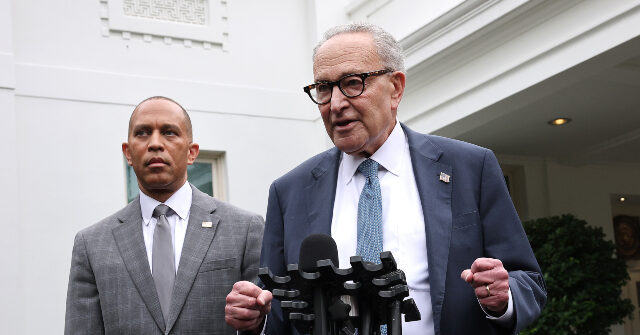The Democrats’ stopgap spending bill counterproposal would add $1.5 trillion to the national debt over the next ten years, according to an analysis.
The government will shut down at midnight September 30 unless lawmakers either agree on passing a stopgap spending bill or pass 12 appropriations bills.
Democrats are staging a fight over the looming government shutdown over the lapsing of the enhanced Affordable Care Act (ACA), or Obamacare, subsidies enacted under the Biden-era America Rescue Plan — the $1.9 trillion coronavirus stimulus plan. The Inflation Reduction Act continued the subsidies, which will now expire if Congress does not extend the enhanced subsidies.
Republican congressional leaders want to negotiate a potential ACA subsidy deal with Democrats outside of the spending bill.
The Democrat proposal, according to the Committee for a Responsible Federal Budget, would cost $1.5 trillion over the next decade.
The Democrat counterproposal would eliminate many of the health savings from the Big Beautiful Bill and would permanently extend the Obamacare subsidies.
Maya MacGuineas, president of the Committee for a Responsible Federal Budget, said in a statement:
If lawmakers want to extend any of the ACA subsidies, they should do so responsibly by targeting the extension and at least offsetting the costs. Ideally we should be offsetting new borrowing twice over. Plenty of options are available, from adopting site-neutral payments to reducing Medicare Advantage upcoding to funding Cost Sharing Reduction payments.
Meanwhile, if lawmakers want to pare back parts of the reconciliation law, they should focus on the $6 trillion in tax cuts and spending increases, not the payfors.
The reconciliation law already put us $4 trillion deeper into the debt. We should not make it worse by continuing to allow providers and state governments to exploit the federal Medicaid match to pad their own bottom lines. It would be one thing to make some targeted changes to the law and offset the costs – but this bill would repeal all the law’s health care savings, throwing out the baby with the bath water.
It’s time to stop the excessive borrowing. Instead of fighting debt with more debt, lawmakers should be using the budget process to reduce deficits. That starts with extending discretionary spending caps and lowering appropriations. But it will also require additional revenue, more health care savings, and spending reductions government-wide.
“Meanwhile, we should be able to keep the government’s lights on without making our devastating fiscal situation even worse,” MacGuineas concluded.
Brian Blase, a former senior healthcare staffer for Trump under his first administration who leads the Paragon Health Institute, noted:
These COVID credits caused a surge of enrollment in the exchanges and higher insurer profits, although many new enrollees were ineligible, unaware they were signed up, or never used their plan.9 Even without the COVID credits, the original subsidies will cost taxpayers nearly $1 trillion over the next decade.10 Continuing the COVID credits would raise that cost by more than 40 percent.11
…
A whopping 40 percent of enrollees in fully subsidized plans had no claims in 2024. In 2024 alone, taxpayers sent at least $35 billion to insurers for people who paid no premiums and never used their plan. This shows the surge in phantom enrollees, people unknowingly signed up or double-covered elsewhere, in the market. According to HHS, there are at least 1.6 million people doubly covered by Medicaid and a subsidized exchange plan.
If Republicans were to fulfill Democrats’ wishes, the extension of the subsidies would cost more than $40 billion per year.
Sean Moran is a policy reporter for Breitbart News. Follow him on X @SeanMoran3.
Read the full article here


